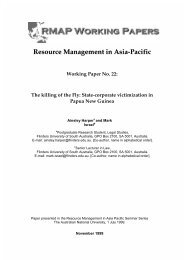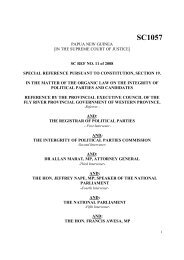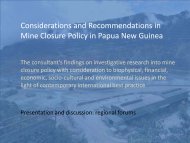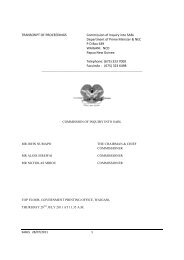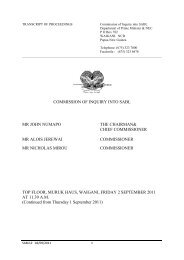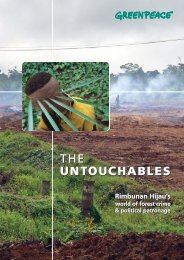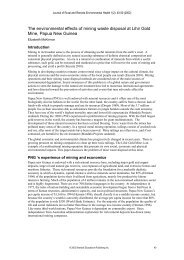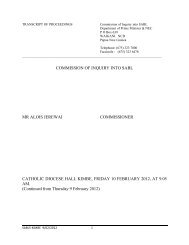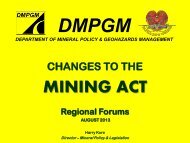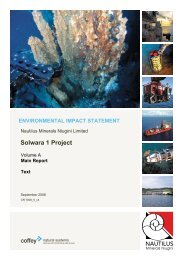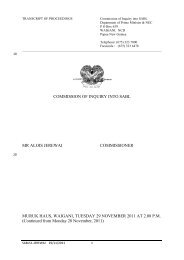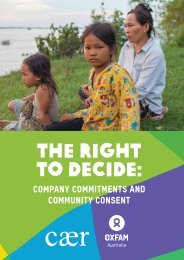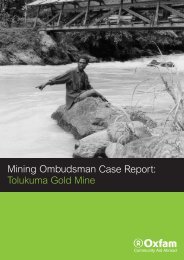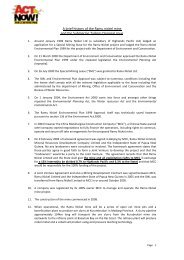IB: “Naaah, just last week we had a hundred people at the gate waiting to come in, to get jobs.<strong>The</strong>y heard that we were looking for new people, for whatever reason, they found out…wordgoes out and we get inundated with people …We run several shifts. Parts <strong>of</strong> the operation runs24 hours…We start bringing fish out on a Sunday evening, four oclock shift, start preparing fishfor the Monday pack, and then there’s butchering and cooking through the night. <strong>The</strong>n in themorning the first production shift starts, and in the evening the second production shiftstarts..We cook the fish and remove the viscera …and we cook it, and the process <strong>of</strong> loining iswe clean it, we totally remove the skin and the bones, we break the loins apart, remove the redmeat, the blood meat, that all goes into fish meal; and then the loins are packed in kryo-vac bagsand frozen and sent on to processors who supplement the loins in their production…we’re not acanners like RD…its just a frozen product…we export to Europe, America, Thailand,American Samoa.”N: “Are you Starkist?”IB: “No, we’re not Starkist…we just sell to mostly the major processors…and then they can itand sell it whomever…we just take orders from the majort packers as its required…we don’tlabel it, its not a finished product..Were doing about 100 to 110 tonnes a day, night and dayshifts included…We have a large freezer here so we can have a large buffer <strong>of</strong> fish in inventory,depends on whether fishing is good or fishing is slow…then we take out 100 tonnes a day…thevessels are owned by the company, based in Taiwan.”N: “Who is Offshore Masters?”IB: “I have no idea. No idea. …No idea…We’ve heard that they’re going to build a factory overhere somewhere..but we don’t know who they are, where they’re from. But we’ve never dealtwith them at all.N: “Is Angco an investor?”IB: “No, not at all…Originally, that was the case, but they have no investment, no investment atall in South Seas…All I know is that they were involved in the project early on, but now…theyhave nothing to do with us, and Kevin Conrad has nothing to do with us either, it was originallyhis idea to build a tuna loining factory but he has nothing to do with it now.N: “So the ownership is?”IB: “FCF. And the provincial government.”Kia: “What percentage is the Provincial Government?”IB: “I don’t know the composition.”N: “Do you have spin <strong>of</strong>f <strong>business</strong>es or how do you give back to town?”IB: “Well, we employ a lot <strong>of</strong> people. A tuna factory like this, there are multipliers out there.We do half a million plus <strong>business</strong> in town, we generate all our own power here, we don’t usethe town supply…we are using water for the town supply, though. We throw revenues back tothe Water Board and wages going out into the <strong>business</strong> communities, we inject money into thecommunity, we get involved in some sponsorships.”88
N: “Have you sponsored sporting groups?”IB: “ No, but I mean we get involved in the community as much as we can. Our cafeteria buyssupplies locally…so it’s…some <strong>of</strong> the local <strong>business</strong>es in PNG we buy a lot <strong>of</strong> parts from.”N: “Are there management programs for training?”IB: “ We don’t have any formalized training programs, but this company is operating, its gotmyself and sixteen other expats only, we don’t have a large, and we obviously, all our positions,we are training when people are available, these people are training to take their positions. Ifyou look around the factory you’ll observe that all the fish cleaning is predominantly by womenemployees and that entire area works under the guidance <strong>of</strong> one expat on each shift and all thesupervisors, team leaders, are local people from Wewak…one or two people had alittleexperience at RD, but all the team leaders supervising out there are all local.”N: “What about landowner issues? This was State land?”IB: “Yeah, I mean, you never get away from the landowner issues, but we have a lease from theDepartment <strong>of</strong> Lands and we have not had any direct demands made <strong>of</strong> us…This was actuallyleased by the Harvbours Board, which bought from the State, and <strong>of</strong> course the traditionallandowners always exist, as I understand it, but this piece was bought by the Harbours Board.“This fish was being processed in Thailand before, it was being caught here…our fishermenoperate with local licenses and with foreign licenses, and the idea that theyre taking all the fishout <strong>of</strong> here, well they’re not fishing out here, this fish is not additional production, in fact a lot<strong>of</strong> the fish we’re supplying was being processed in Marjoro, in the Marshall islands, and thatfactory has been closed down, so really the <strong>business</strong> has shifted here.N: “What if new factories open?”IB: “We’ll, maybe they have to think about whether they’ll be able to survive, but we’re alreadyhere. This is not additional production. I don’t get involved in that end <strong>of</strong> the <strong>business</strong>. <strong>Now</strong> ifthey want to put a factory here, obviously they’ve got to look at the economics <strong>of</strong> it…Oh theboats here were here before, we were fishing for years before we opened.”N: “Do you buy from local fishermen?”IB: “Locals suppliers we haven’t had as yet, we would take fish from local suppliers if they canbring in good quality fish, skip jack or yellowfin…<strong>The</strong>re are no fishing groupsI think there’s alot <strong>of</strong> organizing that needs to be done as yet, but we would definitely support them.”N: “Does anything on the fish say PNG?”IB: “Well, they call it exporting, but really the fish is <strong>of</strong> PNG origin, but the product is stampedfrom another country, we don’t labelt he product at all, we’re registered, this is regiustered inthe USA and we follow their guidelines.But if you picked up Starkest you wouldn’t know wherethe fish came from.“We purse seine the fish…there is a very small quantity <strong>of</strong> what they call miscellaneous orbycatch it might be about ahhh….and now the Provincial Fisheries are buying some <strong>of</strong> that, and89
- Page 1 and 2:
Fishy BusinessThe social impact of
- Page 3 and 4:
4. Townspeople and market women 158
- Page 6 and 7:
More to the point, the contract for
- Page 8 and 9:
‘development’ projects will be
- Page 10 and 11:
whole concept of MSY; the problem o
- Page 12:
noted most reasonably that the skil
- Page 16 and 17:
• That landowners groups be encou
- Page 18 and 19:
This project adopted an open protoc
- Page 20 and 21:
public figures who had seen RD Tuna
- Page 22 and 23:
suddenly costs the government more
- Page 24 and 25:
problems of the poor.’ He pledges
- Page 26 and 27:
scores of landowner groups who regi
- Page 28 and 29:
areas…There were promises of new
- Page 30 and 31:
might say today. This is certainly
- Page 32 and 33:
During the 1950’s over 860,000 co
- Page 34 and 35:
of reorientation of focus and direc
- Page 36 and 37:
But it is the provincial government
- Page 38 and 39: title, sensu the Windjammer, is ‘
- Page 40 and 41: Blue Water Tuna is a private PNG co
- Page 42: 9.5.05: The Bismark Fishing Company
- Page 45 and 46: The two landowning clans of Parom g
- Page 47 and 48: ilong mi na long tingting bilong ol
- Page 49 and 50: ol set ups, say olsem 20 or 30 set
- Page 51 and 52: No contact or awareness with Marien
- Page 53 and 54: Los Angeles, CA 90021USATel: 1-800-
- Page 55 and 56: meters out from its original size,
- Page 57 and 58: The Offshore Masters is going to be
- Page 59 and 60: I am not aware of any Environmental
- Page 61 and 62: “Based on the 970 local labour re
- Page 63 and 64: Water Resources Act (Chapter No. 20
- Page 65 and 66: The 26 Local Level Governments in t
- Page 67 and 68: people were made to believe that ne
- Page 69 and 70: Nianguma, so the leaders of the 8 c
- Page 71 and 72: 3. That there was a totally unbeara
- Page 73 and 74: p10:p12:73
- Page 75 and 76: p.14:75
- Page 77 and 78: . Marine Ripples articleThe followi
- Page 79 and 80: In general, I feel SSTC has present
- Page 81 and 82: •how the tuna factory development
- Page 83 and 84: Responses to Consent Condition Exce
- Page 85 and 86: “Sometimes while working we are t
- Page 87: fisheries myself at one stage and f
- Page 91 and 92: never cleaned fish before, that was
- Page 93 and 94: IB: “Oh sure, but somebody’s go
- Page 95 and 96: Philomena Naura: “The smell aroun
- Page 97 and 98: There is no covering to the oxidizi
- Page 99 and 100: Above: four consecutive pay slips f
- Page 101 and 102: Above is a list of curses said to b
- Page 103 and 104: duties on one of the ships offloadi
- Page 105 and 106: on the side of the fishing vessel.
- Page 107 and 108: The fishery observer told us that i
- Page 109 and 110: Speaking of prostitution on fishing
- Page 111 and 112: and if any major disruptions occur
- Page 113 and 114: Most of us here are very unfortunat
- Page 115 and 116: The husband of the woman employed a
- Page 117 and 118: Thomas Nigints was one of the few p
- Page 119 and 120: Did SST place FADs in the sea?The c
- Page 121 and 122: doing it, it’s going to be over o
- Page 123 and 124: Landowners are also deeply disturbe
- Page 125 and 126: places or settlement where they are
- Page 127 and 128: in the revenue, so when the opportu
- Page 129 and 130: And as soon as they’d finished th
- Page 131 and 132: There is no legal case as yet with
- Page 133 and 134: owns the land legally and therefore
- Page 135 and 136: There is still need to recruit more
- Page 137 and 138: In regard to the production, by the
- Page 139 and 140:
The company invited interested peop
- Page 141 and 142:
strategy is very well used by forei
- Page 143 and 144:
employees and those whose work requ
- Page 145 and 146:
The present Human Resource Manager
- Page 147 and 148:
working gear? In my section I wear
- Page 149 and 150:
working for a whole first week with
- Page 151 and 152:
Serah from Manam island, married wi
- Page 153 and 154:
stret long mipela ol mama husait I
- Page 155 and 156:
The supervisors in the plant/engine
- Page 157 and 158:
The color of the sea has changed. F
- Page 159 and 160:
Donald Jacob, Catrans fuel distribu
- Page 161 and 162:
Kapmandu Service station. Did South
- Page 163 and 164:
Three women involved with roadside
- Page 165 and 166:
export processing zones and then in
- Page 167 and 168:
When we asked if this meant sportin
- Page 169 and 170:
then men’s. Usually they’re exc
- Page 171 and 172:
The WWF consultant also notes that
- Page 173 and 174:
of a company like SST cannot be pla
- Page 175 and 176:
East Sepik Governor Arthur Somare s
- Page 177 and 178:
The cost of the project is between
- Page 179 and 180:
The National Shipping Page, 1.6.04W
- Page 181 and 182:
that have similar fish factory set-
- Page 183 and 184:
Infofish website : PNG: Tuna export
- Page 185 and 186:
Post-Courier 20.6.05185
- Page 187 and 188:
Did your application form ask you a
- Page 189 and 190:
Do you know whether the Provincial
- Page 191 and 192:
The Provincial AdministratorDept. o
- Page 193 and 194:
4. Human Resources registerees, Kew
- Page 195 and 196:
195
- Page 197 and 198:
Under Spin-Off Business Activities
- Page 199 and 200:
Finally, Honourable Ministers, Memb
- Page 201 and 202:
The adverse non-immune (toxic) and
- Page 203 and 204:
low income) will have an impact in
- Page 205 and 206:
ed and pink plastic roses are every
- Page 207 and 208:
207
- Page 209 and 210:
Tuna fisheriesThe management system
- Page 211 and 212:
• Monitor interactions between th
- Page 213 and 214:
Programme is expanding this program
- Page 215 and 216:
This office recommends that, since
- Page 217 and 218:
commercial industry still deny any
- Page 219 and 220:
219
- Page 221 and 222:
221
- Page 223 and 224:
REPORTER: If you come and you put t
- Page 225 and 226:
Berman, M. 1997. Faust, the First D
- Page 227 and 228:
Lutkehaus, N., C. Kaufman, W.E. Mit



